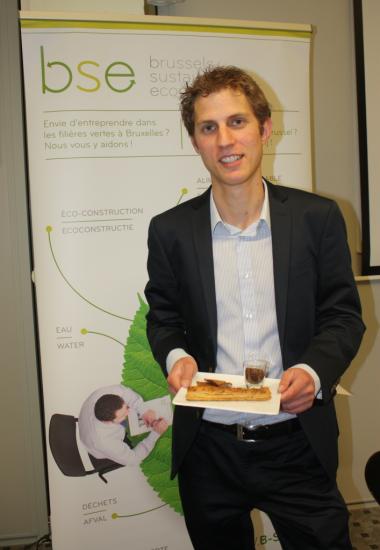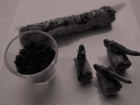
Insect-based cuisine, furniture recycling, leasing out electric bicycles, intelligent lighting… aspiring entrepreneurs are brimming over with environmental projects. The BSE Academy helps them to come to fruition.
***
2013-11-15 – Grasshopper crisps and pastries, or chocolate and grasshopper crumble. These snacks have been successfully trialled, and have whetted an appetite for enterprise. They have in Brecht Vanhecke, at any rate, who has embarked on a slightly zany project to package and market insect-based foods. His plan has won supporters – the panel of selectors at the BSE Academy to start with, and perhaps some investors next. A competition winner in 2013, he is continuing to develop his ‘Bug’s Food’ project in Brussels.
‘I worked in West Flanders for eight years,’ Brecht Vanhecke recalls. ‘One day I saw that there was an academy in Brussels that gave support to innovative projects to do with the environment. There was nothing similar where I lived, so I came to Brussels to pitch my ‘Bug’s food’ project. My idea is to use insects in food. I was selected and am continuing work on the development of my product.’
Giving innovative products a push
The BSE (Brussels Sustainable Economy) Academy aims to promote innovation in environmental protection. The calls for projects, the third of which closes on 30 November 2013, target both people who do not have a specific project but do have skills that could be put to effective use, and people who have concrete projects which they wish to develop either alone or as part of a team. The Academy is financed by the ERDF (European Regional Development Fund), and aims to create businesses and jobs in the environmental sector in the Canal Area. It is managed by Brussels Greentech, the ‘green technology’ specialist centre of the BEA (Brussels Enterprise Agency).
Bug’s Food was selected in late 2012, following the previous call for projects. Since January 2013, Brecht Vanhecke has received various forms of support. ‘Training courses on Saturday and Wednesday evenings – these were really useful to me as I didn’t know where to begin at the outset. Now, after six months’ support, I can see what I need to do. In June, I had to present a theoretical and practical business plan to a panel. It went well, and I won the BSE prize. At present, I am still receiving support from the BEA, enabling me to meet people, talk to possible partners and refine my plans.’
A Brussels network of green entrepreneurs
‘For projects of this kind,’ adds Julie Lenain, project manager at the BSE Academy, people need to meet one another and talk about what they are doing. We discuss the other selected ideas. Around ten projects are chosen per call. For a period of six months, we offer them various joint or specific workshops. The goal is to create a network of green entrepreneurs in Brussels. The training covers skills such as convincing an investor in one minute. At some of the sessions, they are monitored by an individual coach, or receive services from a particular expert. By the end of the six months, they need to be able to present their business plan.’
Testing the product on the public
Brecht Vanhecke wants to make products based on insects that would not be visible. ‘I have worked with a chef in order to create a good product,’ he explains. ‘The quality is there, but to produce it in large quantities is very costly. What’s more, I need to test out consumers’ reactions. The idea is to produce a small quantity and go onto the market to test the products and see if people are prepared to pay to try it out, and then to pay in order to buy more afterwards. At the moment, the insects are produced in France and the Netherlands. If our project works, we may also launch production in Brussels.’
Mealworms, buffalo worms, crickets, grasshoppers and other insects would be powdered and blended with various tasty ingredients. The insects provide plenty of protein. However, the European Commission still needs to say whether the consumption of insects in human food is permitted. While a European decision is awaited, Afsca (the Belgian Federal Agency for Food Chain Security) tolerates it. However, if Europe were to ban it later on, everyone would have to abide by this. This uncertainty is proving an obstacle to investment in this field.
A green solution
But why would you want to eat insects anyway? ‘Two billion people in the world already eat them,’ explains Brecht Vanhecke. ‘It’s a traditional food. The problem is that these people are trying to copy Westerners and want to eat more meat, and producing meat causes pollution. Showing that Westerners eat insects too would send a positive signal to the rest of the world to prevent people from abandoning this high-protein food. Insects could also be used as cattle feed, instead of Brazilian soya, for example.’
A total of 16 projects have been supported by the BSE Academy so far. Four businesses have been set up, and others are in the preparatory stages. The projects vary greatly. They include everything from recycling wooden furniture to leasing electric bicycles, growing organic vegetables in Brussels, producing coffee ground pellets, installing beehives, cleaning up pollution, producing materials made from natural fibres and intelligent lighting.
Anyone with a project can submit an entry in response to the new call, apart from students not in their final year of study. Projects must have an innovative element and must not be purely commercial in character. Job creation potential and added value for Brussels are two criteria which will be taken into account in the selection of projects.
In any case, Brecht Vanhecke is delighted. ‘I’m having a fantastic year,’ he admits, before resuming discussion with a potential partner.
Jean-Pierre Borloo
More information: www.bseacademy.be





















